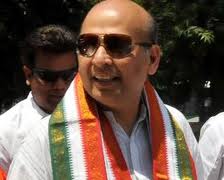
New Delhi, April 23: Congress Rajya Sabha MP Abhishek Manu Singhvi has quit as the chairperson of Parliament Standing Committee on Law and Justice and as the Congress spokesperson following the CD controversy. After the CD allegedly featuring Singhvi surfaced, the Congress sidelined him and removed him from party's official spokespersons roster. Singhvi was the Vice-President of Congress's media cell.
Singhvi in a press release on Monday said that he had informed Congress President Sonia Gandhi about his decision to quit. Claiming that the CD is fabricated and morphed, Singhvi blamed his rivals and those opposing him of spreading canards and baseless allegations against him.
"I have decided to resign as Chairman, Parliamentary Standing Committee on Law, Justice. Personnel and Grievances and have informed the Hon'ble Congress President accordingly. I have also decided not to brief the press," said Singhvi.
"I have done this only to prevent even the slightest possible Parliamentary disruption regarding the purported CDs being circulated about me. Since I am a disciplined party soldier, I did not think it fit to subject the party to any inconvenience on this account. All allegations are patently baseless and false," he said in the letter.
Despite an injunction by the Delhi High, the video went viral on the Internet. The High Court had restrained media from publishing, telecasting and broadcasting the contents of the CD.
Singhvi had on Saturday slammed social networking websites over the CD controversy surrounding him. The Supreme Court lawyer accused the websites of using the CD for sensationalism.
Hitting out at social networking websites, Singhvi pointed that while there was a court injunction on the issue, the author of the alleged CD had also sworn an affidavit in the court and accepted that the contents were fabricated.
"An organised gang has been purposely used by motivated interests to use the social sites for sensationalism and permanent damage," said Singhvi.





Comments
Add new comment